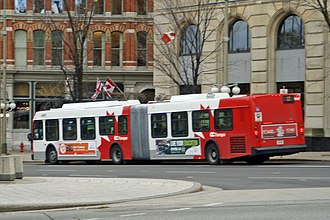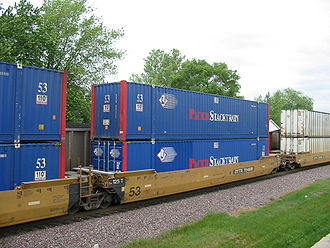By
Transport Action Ontario
|
Intercity Rail and Bus ,
Latest News
In November, 2021, just after the conclusion of the COP26 conference, Transport Action Ontario wrote to key federal ministers discussing the GHG reduction alternative of truck/train intermodal freight movement versus continued highway expansion and the need for federal involvement (e.g. publicly funded incentives) in what is largely private enterprise.
In late June, we received a lengthy, all-be-it largely generic, reply from Transport Canada. It updated us on the government’s approach to climate action. The Strengthened Climate Plan commits the government to working with rail stakeholders to accelerate technology development and implement commercially-ready solutions. Hopefully “commercially-ready” would include intermodal freight movement.
The Transport Canada letter is pasted below in italics:
UNCLASSIFIED / NON CLASSIFIÉ
Dear Mr. Westcar,
Thank you for your email of November 12, 2021, in which you shared with the Minister the views of Transport Action Ontario on the environmental elements that can be taken into account when making decisions related to our transportation system. Particularly, you mentioned the need for an expansion of truck/train intermodal services in the Montréal – Windsor corridor in order to support our climate commitments. My sincere apologies for the delayed reply.
Reducing greenhouse gas (GHG) emissions is a key priority for the Government of Canada. During the Leader’s Summit on Climate Change, hosted by the United States on Earth Day, Canada committed to reducing emissions by 40 to 45% below 2005 levels by 2030 on the road to net-zero in 2050. This is a significant increase in ambition in relation to the previous commitment under the Paris Agreement. Canada has also tabled the Canadian Net-Zero Emissions Accountability Act in the House of Commons, legislating Canada’s goal of net-zero emissions by 2050.
To achieve these ambitious goals, the Government of Canada introduced in December 2020 its Strengthened Climate Plan (SCP), A Healthy Environment and a Healthy Economy. This plan builds on current efforts under the Pan-Canadian Framework on Clean Growth and Climate Change (PCF) to reduce pollution and support a healthier economy and environment through a number of new measures and $15 billion in investments. Building on these investments, Budget 2021 proposed $17.6 billion towards a green recovery to create jobs, build a clean economy, and fight and protect against climate change.
Clean transportation is a crucial part of Canada’s SCP, as the transportation sector accounts for 25% of Canada’s GHG emissions. For that reason, the SCP brought forward the commitment to work with rail stakeholders to accelerate technology development and pilot deployments, as well as supporting the implementation of commercially-ready solutions, among several other initiatives to decarbonize other modes of transportation.
In April of this year, the Government of Canada released its Emission Reduction Plan for 2030, in which we have committed to working with other levels of government, and in collaboration with key federal partners on additional emission reductions from transportation. Your views will support us in considering our next steps in this regard.
In your letter, you mentioned the Highway 413 project and its implications on our transportation infrastructure and its environmental impacts. As a federal authority under the Impact Assessment Act, Transport Canada anticipates participating in the impact assessment process for this project including providing advice and expertise in relation to our mandate.
Thank you for sharing your concern for tackling climate change and providing your views on ways the Government of Canada can continue to work towards reducing GHG emissions from Canada’s transportation system and improving the efficient and effective movement of goods.
Sincerely,
Michelle Sanders
Acting Director General, Environmental Policy / Directrice générale par intérim, Politiques environnementales
Transport Canada / Transports Canada
Place de Ville, Tower C / Tour C
330 Sparks Street / 330 rue Sparks
Ottawa, ON K1A 0N5






